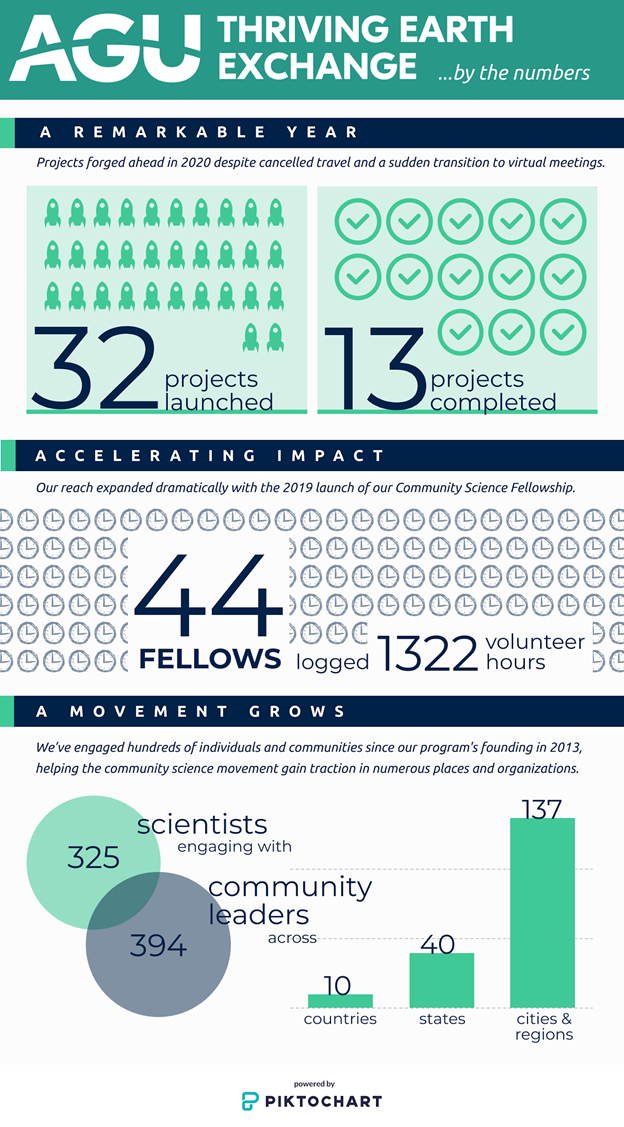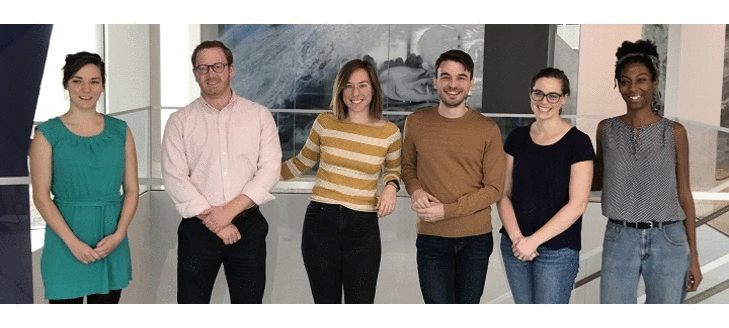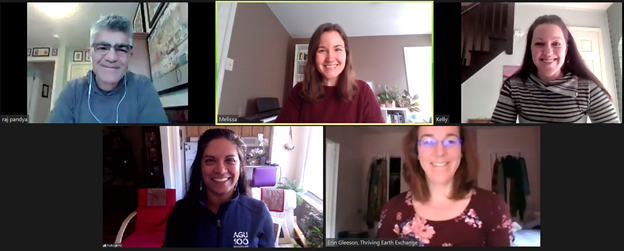2020 Thriving Earth Exchange Year in Review
2020 was a year of change in ways none of us anticipated. Along with the rest of the world, the Thriving Earth Exchange team and our network of fellows, community leaders, scientific partners and collaborators were challenged to accept, accommodate and adapt as the COVID-19 pandemic transformed the way we work and live.
For us, 2020 was also a year of growth. We started the year with a look back: A comprehensive program evaluation brought into focus all that we had accomplished in our first six years and illuminated opportunities to have an even greater impact. In the months that followed, even as we grappled with cancelled travel and virtual meetings, we forged ahead with building our next chapter and expanding our reach.
Our program’s activities this year reflect three major roles:
- We manage community science projects, following and improving the community science approach we established over the past seven years.
- We teach individuals to manage community science projects through a fellowship program that cultivates a new generation of community science leaders.
- We teach organizations to manage community science projects through collaborations that empower others to adopt and build on our community science experience and expertise.
This year, our focus was not only on doing community science, but on fostering the growing community science movement. As interest in this way of working has expanded, organizations like the National Science Foundation and the National Academies of Sciences, Engineering, and Medicine have looked to our program for ideas and suggestions about how to help ensure science serves the needs of society and communities.
We enter 2021 with an acute awareness of the uncertainties inherent in life and science. While the coming year will doubtless bring achievements and challenges alike, we look forward to the year with a fresh vision for supporting communities and their evolving priorities—as well as a renewed sense of confidence in what we can achieve when we work together.
 Our Projects
Our Projects
2020 saw our cohort model for community science come to fruition. Nearly all projects launched this year were facilitated within a cohort, in which multiple projects move through the community science process in tandem, creating a shared journey that allows project teams to learn from each other along the way. It’s a model that has proven its mettle this past year.
We completed 13 projects and launched 32 new ones, each effort designed to address a specific community priority in areas such as climate action, flooding, natural spaces, sustainability, and the environmental and public health impacts of human activities on air, water and soil.
Projects launched in 2020
In addition to these formal projects, we enjoyed exploring opportunities with other communities not listed and hope to welcome them to the program in the future.
Projects completed in 2020
Fellowship Program
Complementing our shift to a cohort model, this year we also transitioned from staff-managed projects to a fellowship-based management model. Community Science Fellows are committed volunteers who facilitate and lead community science projects. Each Fellow is matched with a local community and is responsible for guiding a project from idea to impact. Fellows gain essential skills through a two-day training and receive ongoing support from Thriving Earth Exchange staff and a peer group of Fellows.
The program, piloted in 2019, expanded dramatically in 2020 and has proved valuable for our participants, our program, and our community partners. Fellows gain experience managing diverse teams, working across disciplinary boundaries and connecting science to action, while an expanded pool of project managers has increased our program’s reach and amplified our impact.
Fellowship cohorts active in 2020

Partnerships and Collaborations
Collaboration has always been core to the Thriving Earth Exchange ethos. This year, our partnerships and collaborations reached new heights—and new continents! We established our first four international partnerships, part of a special effort focused on enabling other organizations to manage community science projects in their local regions. We also cultivated fruitful relationships with many U.S.-based organizations to increase community-centric approaches and co-manage community science projects.
Reflecting on a Year of Change
2020 changed us as individuals and as a society. Two main waves of change in particular—the enhanced visibility of the movement to advance anti-racism in science, and the adaptations made in response to the COVID-19 pandemic—brought new perspective to what Thriving Earth Exchange does and how we do it.
Anti-racism in science
The murder of George Floyd—and the many who came before—exposed anew the inherent weakness and injustice of a society built on systemic racism. Joining many other scientific organizations in looking inward to confront the ways racism influences the STEM community, AGU renewed its commitment to create an inclusive and equitable community for all. In taking a serious look at our responsibility and our opportunity to advance justice, we focused on how we as scientists must become part of the solution not only through awareness, but through reform.
Impacts of the COVID-19 pandemic
Community science does a lot of things, but most of all, community science listens. As the world absorbed the dramatic changes the COVID-19 pandemic brought in our lives and our communities, we listened to what our community leaders and scientific partners were experiencing and what they needed from us. And then we did what we had to do: we adapted. We exchanged tips for effective virtual collaboration, shared creative and compassionate ideas for DIY COVID-19 solutions, and started conversations about what comes next. We found new ways to support our communities to advance both longstanding and newly emerging priorities, and we even found ways to reallocate funding from travel and onsite operational expenses, allowing us to serve even more communities.
A message of hope
In losing some of our stability this year as a society, we also lost some of our complacency. The nation’s experiences brought into stark relief many challenges that had been brewing under the surface for a long time. The suppression of minority communities and voices, the disproportionate impact of society’s ills on certain groups, and the tendency for attention and benefits to accrue in places that already enjoy advantages of wealth and privilege—these challenges have long been known to the communities we serve, many of which suffer disproportionate impacts from environmental hazards, climate change and activities that threaten the health of people and ecosystems. It is our hope that with the surfacing of these injustices, we can find renewed vigor and a greater sense of unity in the effort to right the wrongs and build a better future for all communities.


1 Comment
Shannon VattikutiMar 2, 2021 at 12:41 PM
It is wonderful news that AGU Thriving Earth Exchange has completed many of the annual goals it set out to accomplish. I like the community fellowship and collaborations as it exhibits a circularly-evolving holistic framework. Keep up the fantastic research, advocacy and scientific outreach AGU!